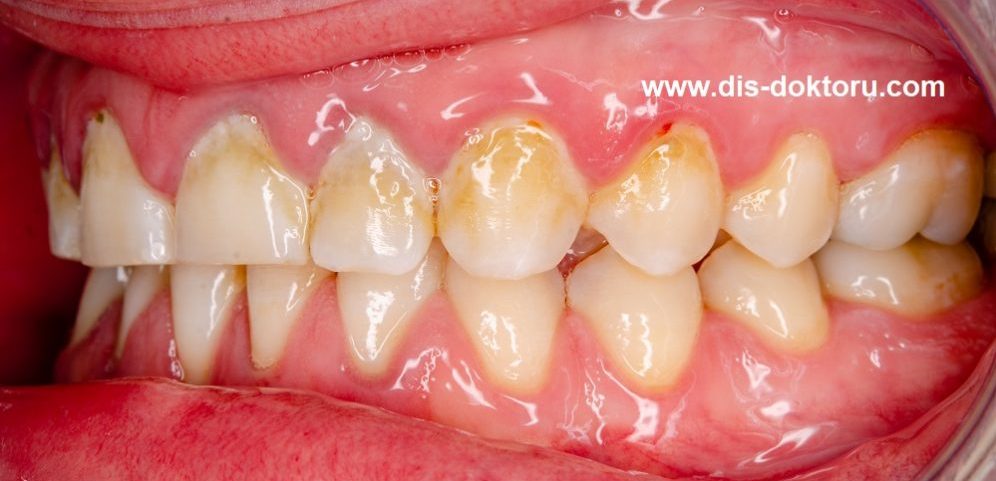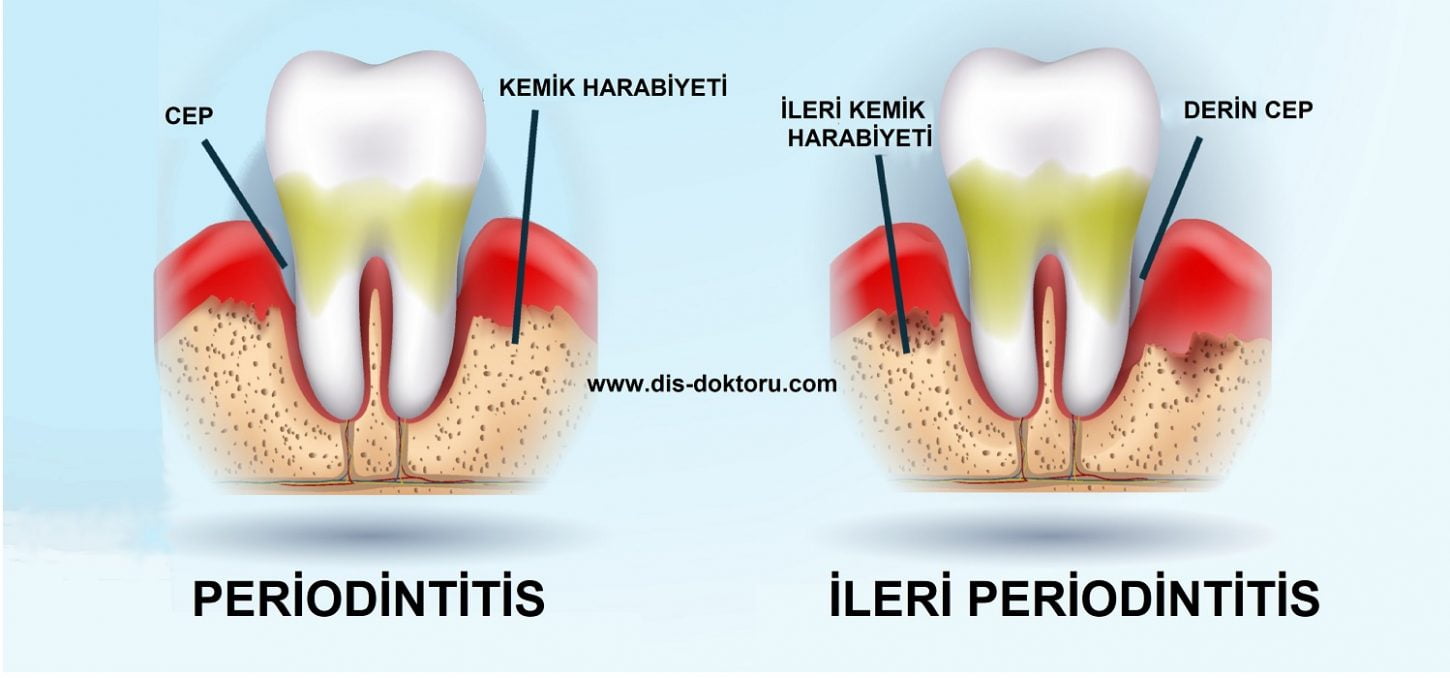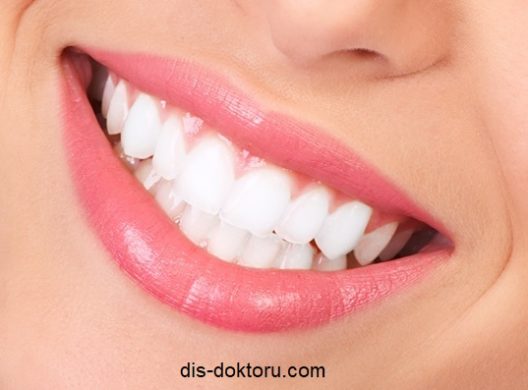Symptoms of Gum Disease
If you have one or more of the following symptoms, you probably have gingival (gum) disease (In this case, you should go to the dentist for gingival treatment);
- The first and most important symptom of gum diseases is bleeding gums.
- Redness of the gums,
- Inflammation between the tooth and gingiva,
- Persistent feeling of bad odor and bad taste in the mouth.
Gum diseases can get worse without the above symptoms or without being noticed. Therefore, it is necessary to go to the dentist at regular intervals (every 6 months). [1]
Complications of Gum Diseases
Microorganisms in the gums can mix with the blood through the capillary blood vessels in the gums, as shown in the figure below. [1] “Microorganisms that mix with the blood can spread to many organs as well as cause occlusion of the heart vessels and the emergence of heart diseases. It can also increase the risk of gum disease, lung and respiratory diseases. Therefore, it is necessary to pay attention to tooth and gum diseases.” [1]

 Gum Disease Treatment (Periodontology)
Gum Disease Treatment (Periodontology)
Periodontology is the branch of dentistry that deals with diseases that occur in the tissues around the teeth (gingival, alveolar bone, periodontal ligament).
Gingivitis:
Gingivitis is the inflammation of the bacterial plaque accumulating on the teeth and surrounding tissues by affecting the gums. Gingivitis causes redness, swelling, bleeding, itching in the gums, and the gums lose their firmness and move away from the tooth.

Gingivitis is a disease that is frequently encountered in the absence of regular dental care. Tooth brushing should not be stopped due to bleeding. It should be brushed more carefully and more often.

If the disease does not improve or remains the same, a dentist should be examined and necessary treatments should be performed.
Treatment of Gum Diseases
It is impossible for you to completely clean the microorganisms in the tartar formed as a result of the plaque accumulated on the teeth by brushing and using dental floss. For this reason, it would be appropriate to be cleaned by the dentist with ultrasonic instruments.
If periodontitis, which is the advanced stage of gingival diseases, is not intervened in a timely manner, it can weaken the bone and fibers holding the tooth in place, leading to sagging and even loss of the tooth. In the treatment of this disease, after cleaning the tartar and bacterial plaque, the sick tissues are removed by a method called curettage under local anesthesia.
The hard soft tissues surrounding the teeth are called periodons. Treatment of periodonsium diseases varies according to the progression of the disease. In gingivitis, tartar is cleaned and oral hygiene education is given to patients. In periodontitis, the stones in the gingival pocket and on the root surface should also be removed by curettage.

How can gum diseases be prevented?
The most important task in the prevention of periodontal disease belongs to the person himself.
In order to maintain the teeth in a healthy condition, it is necessary to remove bacterial dental plaque with daily oral care procedures (tooth brushing and dental floss). It is equally important to visit the dentist regularly. Daily oral care procedures can minimize the formation of calculus, but may not prevent it completely. Areas that cannot be reached with a toothbrush, dental floss or other cleaning tools should be evaluated by a dentist, and then the existing dental plaque and calculus, if any, should be removed.
However, sometimes due to some factors, gum diseases cannot be completely prevented despite careful attention to oral and dental hygiene. For these reasons, it is necessary to visit the dentist at regular intervals and if the dentist considers it necessary as a result of the evaluation, professional dental cleaning should be done. [1]
What Causes Gum Disease?
The causes of gum diseases are as follows [1]
- Poor and irregular oral care
- Drug use (birth control pills, anti-depressants, etc.)
- Stress
- malnutrition
- genetic factors
- Diabetes
- Cigarette
- Poorly made fillings, crowns and bridges
Gingival recession
Gingival recession is when the gingiva is lower than where it should be (enamel-cementum boundary) and the root surface is exposed. [1]
The tooth tissue exposed in dental treatment can be covered with a filling or veneer. Thus, the sensitivity of the tooth is removed. In aesthetic cases where the gingiva is desired to be restored, the gingiva should be treated surgically. [1]
What is the price / fee of gum treatment?
The cost of gum treatment varies according to the condition of the gums and the treatment to be applied. After the examination in our clinic, we can give more precise information.
Our Dental Clinic is in Gebze
Our Dental Clinic is in Gebze District of Kocaeli. It is close to Darica, Bayramoglu and Dilovasi.
View our Dental Clinic (Gebze) on map >>>
Videos on gum diseases
TDB’s video on gums?
The relationship between gum disease and kidney failure video
Is there a relationship between gum disease and kidney failure? The answer is in the video below.
HEALTHY MOUTH AND TEETH PROVIDE AN IMPORTANT CONTRIBUTION TO THE HEALTH OF KIDNEYS, SMARTS, RESPIRATORY SYSTEM AND OTHER ORGANS and are an important determinant of overall health.
References
